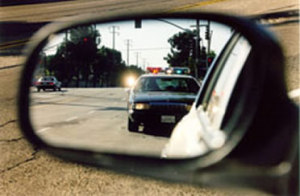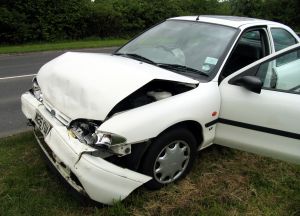Florida Statute 316.2953 provides the law on window tinting and what is legal in the State of Florida. It states that “a person shall not operate any motor vehicle on any road on which vehicle the side wings and side windows on either side forward of or adjacent to the operator’s seat are composed of, covered by, or treated with any sunscreening material or other product or covering which has the effect of making the window nontransparent or which would alter the window’s color, increase its reflectivity, or reduce its light transmittance.” The statute provides that “a sunscreening material is authorized for such windows if, when applied to and tested on the glass of such windows on the specific motor vehicle, the material has a total solar reflectance of visible light of not more than 25 percent as measured on the nonfilm side and a light transmittance of at least 28 percent in the visible light range.” What happens if a police officer sees your window tint and pulls you over, resulting in DUI arrest?
 In State v. Coley, 157 So.3d 542 (Fla. 4thDCA 2015), Gary Coley was stopped by police for an illegal window tint. He was charged with possession of cocaine and cannabis and he moved to suppress any and all contraband seized, and statements made, arguing that there was not probable cause for the stop. The police officer testified that he had issued many citations for illegal tints of side windows during the hearing. He stated that in his experience, the tint is illegal where the driver of the vehicle cannot be seen. The officer correctly stated that per statutory regulation, a tint measurement of less than 28 % is illegal. The officer indicated that he stopped Coley because he could not see the driver of the vehicle through the tint of its side windows, thereby giving him probable cause to conduct the traffic stop. The defense argued that the traffic stop was illegal due to the officer’s mistake of law because the law does not state that if a driver cannot be seen through it, then the tint is illegal. The trial court granted the motion to suppress.
In State v. Coley, 157 So.3d 542 (Fla. 4thDCA 2015), Gary Coley was stopped by police for an illegal window tint. He was charged with possession of cocaine and cannabis and he moved to suppress any and all contraband seized, and statements made, arguing that there was not probable cause for the stop. The police officer testified that he had issued many citations for illegal tints of side windows during the hearing. He stated that in his experience, the tint is illegal where the driver of the vehicle cannot be seen. The officer correctly stated that per statutory regulation, a tint measurement of less than 28 % is illegal. The officer indicated that he stopped Coley because he could not see the driver of the vehicle through the tint of its side windows, thereby giving him probable cause to conduct the traffic stop. The defense argued that the traffic stop was illegal due to the officer’s mistake of law because the law does not state that if a driver cannot be seen through it, then the tint is illegal. The trial court granted the motion to suppress.
The Fourth District Court of Appeals held that a traffic stop is permissible under the Fourth Amendment where an officer has probable cause to believe that a traffic infraction occurred. The court provided: “As we have previously recognized, the probable cause standarddoes not demand any showing that such belief be correct or more likely true than false. A ‘practical, nontechnical’ probability … is all that is required…. Finally, the evidence thus collected must be seen and weighed not in terms of library analysis by scholars, but as understood by those versed in the field of law enforcement. State v. Neumann, 567 So.2d 950, 952 (Fla. 4th DCA 1990) (citations omitted) (quoting Texas v. Brown, 460 U.S. 730, 742, 103 S.Ct. 1535, 75 L.Ed.2d 502 (1983)).”
 Jacksonville Criminal Defense Lawyer Blog
Jacksonville Criminal Defense Lawyer Blog





